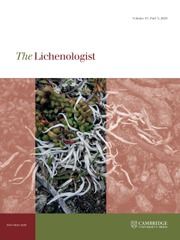Crossref Citations
This article has been cited by the following publications. This list is generated based on data provided by
Crossref.
Jüriado, Inga
Liira, Jaan
Paal, Jaanus
and
Suija, Ave
2009.
Tree and stand level variables influencing diversity of lichens on temperate broad-leaved trees in boreo-nemoral floodplain forests.
Biodiversity and Conservation,
Vol. 18,
Issue. 1,
p.
105.
JÜRIADO, Inga
LIIRA, Jaan
and
PAAL, Jaanus
2009.
Diversity of epiphytic lichens in boreo-nemoral forests on the North-Estonian limestone escarpment: the effect of tree level factors and local environmental conditions.
The Lichenologist,
Vol. 41,
Issue. 1,
p.
81.
Hill, David J.
2009.
Asymmetric Co-evolution in the Lichen Symbiosis Caused by a Limited Capacity for Adaptation in the Photobiont.
The Botanical Review,
Vol. 75,
Issue. 3,
p.
326.
Campbell, Jocelyn
Bradfield, Gary E.
Prescott, Cindy E.
and
Fredeen, Arthur L.
2010.
The influence of overstorey Populus on epiphytic lichens in subboreal spruce forests of British Columbia.
Canadian Journal of Forest Research,
Vol. 40,
Issue. 1,
p.
143.
Lamit, L.J.
Bowker, M.A.
Holeski, L.M.
Næsborg, R. Reese
Wooley, S.C.
Zinkgraf, M.
Lindroth, R.L.
Whitham, T.G.
and
Gehring, C.A.
2011.
Genetically-based trait variation within a foundation tree species influences a dominant bark lichen.
Fungal Ecology,
Vol. 4,
Issue. 1,
p.
103.
LEPPIK, Ede
JÜRIADO, Inga
and
LIIRA, Jaan
2011.
Changes in stand structure due to the cessation of traditional land use in wooded meadows impoverish epiphytic lichen communities.
The Lichenologist,
Vol. 43,
Issue. 3,
p.
257.
Honegger, R.
2012.
Fungal Associations.
p.
287.
Ellis, Christopher J.
2012.
Lichen epiphyte diversity: A species, community and trait-based review.
Perspectives in Plant Ecology, Evolution and Systematics,
Vol. 14,
Issue. 2,
p.
131.
Calviño-Cancela, María
López de Silanes, María Eugenia
Rubido-Bará, Marga
and
Uribarri, Joseba
2013.
The potential role of tree plantations in providing habitat for lichen epiphytes.
Forest Ecology and Management,
Vol. 291,
Issue. ,
p.
386.
Ellis, Christopher J.
Ellis, Simon C.
and
Ejrnæs, Rasmus
2013.
Signatures of autogenic epiphyte succession for an aspen chronosequence.
Journal of Vegetation Science,
Vol. 24,
Issue. 4,
p.
688.
Koch, Natália Mossmann
Martins, Suzana Maria de Azevedo
Lucheta, Fabiane
and
Müller, Sandra Cristina
2013.
Functional diversity and traits assembly patterns of lichens as indicators of successional stages in a tropical rainforest.
Ecological Indicators,
Vol. 34,
Issue. ,
p.
22.
Deduke, C.
Booth, T.
and
Piercey-Normore, M.D.
2014.
Lichen fecundity on the Precambrian Shield: an alternative life history strategy approach.
Botany,
Vol. 92,
Issue. 10,
p.
723.
Trischler, Johann
Sandberg, Dick
and
Thörnqvist, Thomas
2014.
Estimating the Annual Above-Ground Biomass Production of Various Species on Sites in Sweden on the Basis of Individual Climate and Productivity Values.
Forests,
Vol. 5,
Issue. 10,
p.
2521.
Lamit, L. J.
Lau, M. K.
Næsborg, R. Reese
Wojtowicz, T.
Whitham, T. G.
and
Gehring, C. A.
2015.
Genotype variation in bark texture drives lichen community assembly across multiple environments.
Ecology,
Vol. 96,
Issue. 4,
p.
960.
Giordani, Paolo
and
Brunialti, Giorgio
2015.
Recent Advances in Lichenology.
p.
19.
Kubiak, Dariusz
Osyczka, Piotr
and
Rola, Kaja
2016.
Spontaneous restoration of epiphytic lichen biota in managed forests planted on habitats typical for temperate deciduous forest.
Biodiversity and Conservation,
Vol. 25,
Issue. 10,
p.
1937.
Li, Su
Liu, Shuai
Shi, Xian-Meng
Liu, Wen-Yao
Song, Liang
Lu, Hua-Zheng
Chen, Xi
and
Wu, Chuan-Sheng
2017.
Forest Type and Tree Characteristics Determine the Vertical Distribution of Epiphytic Lichen Biomass in Subtropical Forests.
Forests,
Vol. 8,
Issue. 11,
p.
436.
Randlane, Tiina
Tullus, Tea
Saag, Andres
Lutter, Reimo
Tullus, Arvo
Helm, Aveliina
Tullus, Hardi
and
Pärtel, Meelis
2017.
Diversity of lichens and bryophytes in hybrid aspen plantations in Estonia depends on landscape structure.
Canadian Journal of Forest Research,
Vol. 47,
Issue. 9,
p.
1202.
McDonald, L.
Van Woudenberg, M.
Dorin, B.
Adcock, A.M.
McMullin, R.T.
and
Cottenie, K.
2017.
The effects of bark quality on corticolous lichen community composition in urban parks of southern Ontario.
Botany,
Vol. 95,
Issue. 12,
p.
1141.
MORANDO, M.
FAVERO-LONGO, S. E.
CARRER, M.
MATTEUCCI, E.
NASCIMBENE, J.
SANDRONE, S.
APPOLONIA, L.
and
PIERVITTORI, R.
2017.
Dispersal patterns of meiospores shape population spatial structure of saxicolous lichens.
The Lichenologist,
Vol. 49,
Issue. 4,
p.
397.


